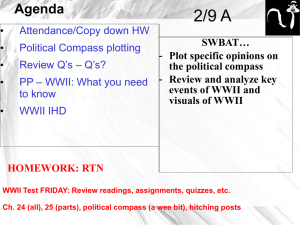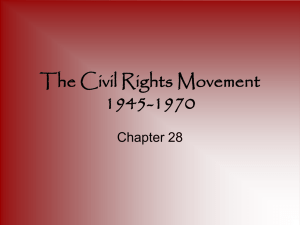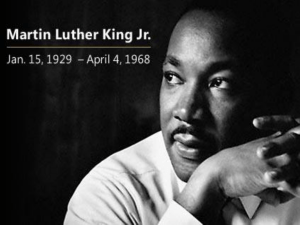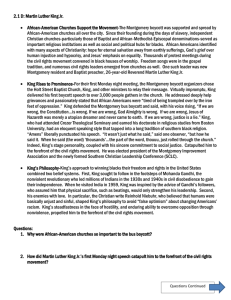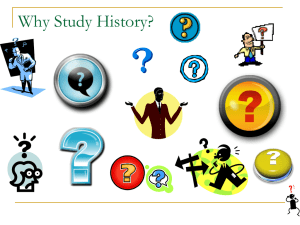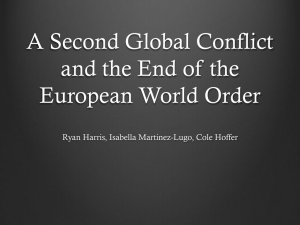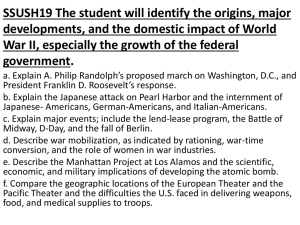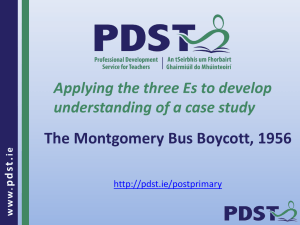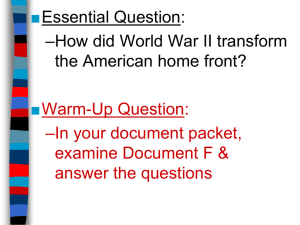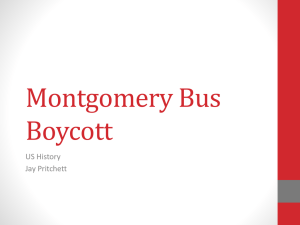14. Continuing prejudice after WWII - blogs
advertisement
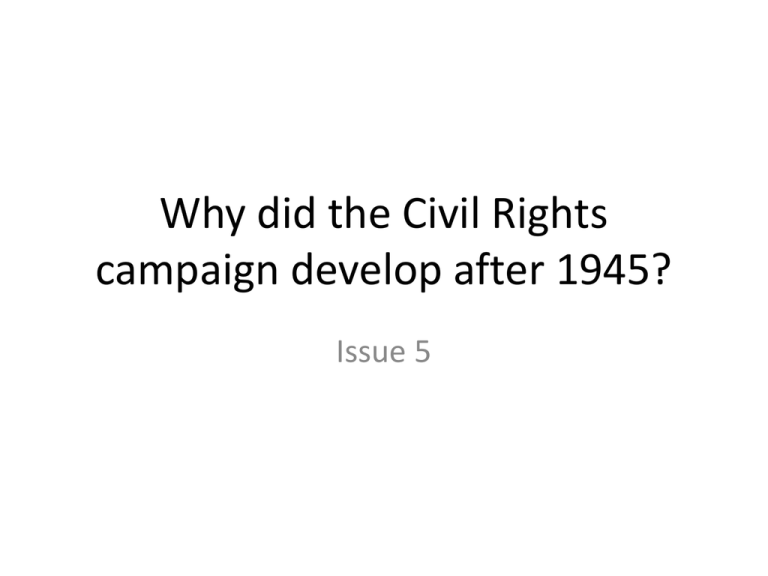
Why did the Civil Rights campaign develop after 1945? Issue 5 Issue 5 Continued prejudice Experience of black servicemen in WWII Civil Rights after 1945 Role of Martin Luther King Jr Emergence of effective black organisations Emergence of effective leaders Continued Prejudice post WWII 1. WWII brought democracy and liberty to the forefront of society – yet in the USA AfricanAmericans were not experiencing equality e.g. Jim Crow laws 2. Education – Brown Vs. Board of Education, Little Rock 9 3. Violence – Racially motivated murder of Emmet Till 4. Transport – Rosa Parks and Montgomery Bus Boycott • Historian Dr Stephen Tuck believes WWII was “absolutely key”. The increase in defence industries led to greater economic and political power of blacks as well as greater safety in the cities away from white supremacy. • US racism was very similar to Hitler’s racism – what they were fighting against! March on Washington Movement – called for ‘ten, twenty, thirty thousand negroes on the white house lawn’ if their demands to end SEGREGATION and discrimination in federal and defence jobs were not met. EXECUTIVE ORDER 8802 1941 – No discrimination in defence industry because of ‘race, creed or natural origin’ Brown Vs Topeka Board of Education, 1954 • The Supreme Court ruled in favour of Linda Brown. Her father campaigned for her to go to the nearest and best school in her area regardless of whether it was for white pupils. • This was landmark legislation as it overturned the ‘separate but equal’ ruling of 1896. Little Rock Arkansas 1957 Read p39-41 • How did the NAACP challenge the Brown Vs Board of Education decision? • How were the Little Rock 9 received? • Why would this encourage a civil rights campaign to develop? State government can no longer ignore Federal law. Publicity of Little Rock 9 encouraged the movement and increased determination Murder of Emmet Till, 1955 • 14 year old Emmet supposedly wolf whistled at a white woman. His mutilated body was found in the Tallahatchie river in Mississippi. • His mother held an open casket funeral. The case was the first in Mississippi to accuse white men of a racially motivated murder. However they were found not guilty. This encouraged many to join the civil rights movement. White extremism often strengthened black unity. 1955 Rosa Parks and the Montgomery Bus Boycott This was seen as the real beginning of the Civil Rights movement. Read p42-45 Why? . Where? Who? What happened? Success/Failure? Overall importance of this event? Quick Quiz 1. Name the man who first planned a March on Washington Movement? 2. What was the name of the ruling passed by FDR in response? 3. What was the name of the court case that led to the Supreme Court declaring that segregation in education unconstitutional? 4. Name the two organisations involved in the Montgomery bus boycott? 5. What was the name of the boy who was brutally murdered and in which state did it happen? HISTORIOGRAPHY Historian David Garrow argues that the Bus Boycott was the start of the civil rights movement However, Historian Mark Newman disagrees and said it “did not spark a mass movement” because the SCLC group that formed as a result achieved little in the 3 years after the bus boycott Experience of Black servicemen in WWII 1. DOUBLE V CAMPAIGN SHOWED DETERMINATION- Segregation in armed forces unit and separate facilities in army camps further increased demands for equality – the Double V campaign was a call for Victory in the war and Victory for Civil Rights. They returned to white hostility instead of respect and jobs. 2. GREATER ACTIVISM shown by formation of CORE (Congress of Racial Equality) during WWII in 1942. They introduced the principal of peaceful protest. More also joined the NAACP 3. IMPROVED EDUCATION for demobilised African-American soldiers given government aid for education therefore made them more articulate in demanding equality. 4. A. PHILLIP RANDOLPH’S EFFORTS proved to be a persuasive leader and that the Federal government would take action if pressure was applied. HISTORICAL ARGUMENT Historian Newman said the WWII acted as a catalyst for the movement because of the experiences of Black servicemen How important is WWII experience in developing a civil rights campaign? HISTORICAL ARGUMENT Historian Neil Wynn said that the movement of the 1950s and 1960s was “born out of frustrated expectations from the previous decades” A Black soldier put it simply: “At the end of the war, we just kept fighting. It’s that simple.” Emergence of effective black organisations 1942 Congress of Racial Equality (CORE) p37 1957 Southern Christian Leadership Conference (SCLC) p46-47 1960 The Student NonViolent Co-ordinating Committee (SNCC) p47-48 • For each organisation note down why they were established and list their achievements/protests Organisation vid clips! • http://www.youtube.com/watch?v=KwYOBmn cyZ4 MLK and SCLC • http://www.youtube.com/watch?v=gc8r97KZKk James Farmer and CORE • http://www.youtube.com/watch?v=C6L1Hyoh 3rY SNCC
